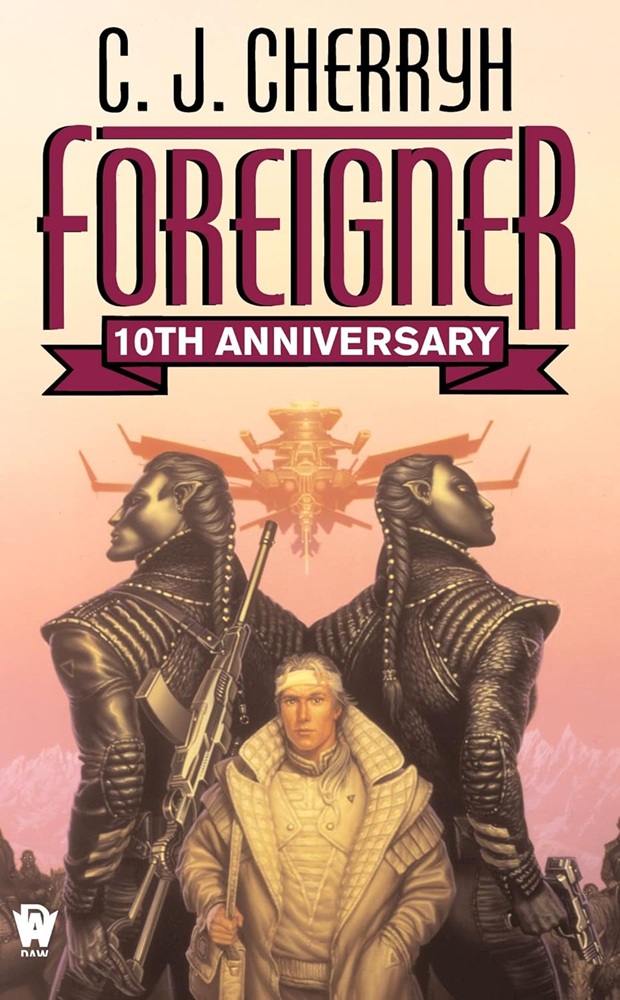
Genres: Adult, Sci Fi
PoV: Third-person, past-tense
ISBN: 1101554746
Goodreads

THE SPACE OPERA CLASSIC: Discover “one of the best long-running science fiction series in existence” (Publishers Weekly)!
A sole human diplomat navigates a world inhabited by hostile, intelligent aliens—and learns the consequences of first contact.
It had been nearly 5 centuries since the starship Phoenix, lost in space and desperately searching for the nearest G5 star, had encountered the planet of the atevi. On this alien world, law was kept by the use of registered assassination; alliances were defined by individual loyalties, not geographical borders; and war became inevitable once humans and one faction of atevi established a working relationship. It was a war that humans had no chance of winning on this planet so many light-years from home.
Now, nearly 200 years after that conflict, humanity has traded its advanced technology for peace and an island refuge that no atevi will ever visit. But then the sole human allowed into atevi society is marked for an assassin’s bullet. The work of an isolated lunatic? The interests of a particular faction? Or the consequence of one human’s fondness for a species which has 14 words for betrayal and not a single word for love?
Highlights
~13/10 worldbuilding, A++, I am heart-eyes
~assassination is legal here
~am i being abducted or protected
~(bit of both)
~dON’t DRiNk tHe tEA, mORoN!
Quick note: I usually bold book titles and don’t mark series names, but because the book title and series name are the same here, in this review I bold Foreigner when I’m talking about the book, and italicise Foreigner when I’m talking about the series!
FRIENDS, I AM HOOKED.
Cherryh’s prose is so freaking addictive, I cannot even. I read this first book in less than 12 hours, staying up until 4am to finish it (and went on to finish book two not 24 hours later, despite an extra 100 of pagecount) and regret ABSOLUTELY NOTHING.
And I cannot put my finger on what it is about Cherryh’s writing that I like so much, because it’s not my usual style – it’s not what I’d call plain, but it’s definitely not laden down with description either (I was actually unimpressed, at first, with how minimal are the visual descriptions). I would call it direct, except that we spend a(n absolutely delicious) great deal of time on introspection, on the main character almost obsessively analysing his own thoughts and feelings and trying to infer the thoughts and feelings of those around him (both of which, analysing himself and analysing the aliens around him, are vital parts of his job description and extremely relevant to literally everything).
The worldbuilding, though. THE FREAKING WORLDBUILDING!
Like the prose, I was initially disappointed with the worldbuilding: the atevi are very human-like, as you can see from the illustration on the book cover; they live in houses like ours, built castles like we did, their art is very like ours (tapestries, banners, painted tiles). We quickly learn that assassination is a legal, socially acceptable thing in their culture – but other than that, it’s not immediately obvious that the atevi are Not Human.
This is part of Cherryh’s genius.
Because it guides the reader into the same trap that our main character Bren – and all the humans in this setting – fall into constantly, and must forever be on guard against: assuming, reflexively assuming, that the atevi are, fundamentally, Not That Different.
And they really, REALLY are.
The (short) parts one and two of Foreigner cover how humans ended up on the atevi’s planet, and what the initial First Contact looked like. Honestly, these bits hardly matter – one of the reasons it took me so long to read Foreigner was that I kept bouncing off the (to me) very dull part one, which is scary and depressing space travel and thus doesn’t interest me at all.
But part three is the main chunk of the novel, and INFINITELY more interesting: we follow Bren, who is the current paidhi – a role somewhere between a translator and an ambassador between humans and atevi. He lives full-time at the atevi ‘court’ nearest the human settlement (there is only one: humans are vastly the minority on this planet) and sees no other humans at all for most of the year, as the all-important Treaty insists there only be one human allowed out of the human settlement at a time. One of the most important aspects of his job is feeding pre-arranged bits of human technology and science to the atevi, small pieces at a time; humanity wants to get back into space travel, and the long-term goal has been to guide the atevi to a technological point where they can help make that happen. But – in a move that is honestly surprisingly ethical, all things considered! – humans are doing this very gradually, understanding that they have to give atevi civilisation time to adjust to each new piece of tech or science. It would do much more harm than good to give them everything at once, after all. By the time the main novel opens, it’s been 200 years since humans showed up, and the atevi now have television, forensics, and airplanes, though the latter are still pretty new.
Plot-wise: someone attempts to assassinate Bren for no apparent reason, and the ‘king’ whisks him deeper into the continent than humans have ever been allowed, purportedly for his own safety. Where he meets the ‘king’s’ extremely impressive grandmother (I love her, I would drink her tea, she can step on me any time she likes and I will thank her for it), gets a crash-course in traditional/rural atevi life and culture, and finds himself in the middle of a (small-ish) civil war.
It’s not an especially fast-paced book at first, and I think that’s wise: the reader needs a little time to adjust to the setting, especially the (minimal) atevi terminology and the…way-of-being of the atevi characters. Bren spends a fair chunk of the book not knowing what’s going on, being deliberately kept in the dark and cut off from a) his species and b) any information about what’s happening outside. This is frustrating for the reader, but it’s a legit frustration – it’s Bren’s frustration! Bren is not given any way to be an active participant in this part of the story, which is one reason it’s wonderful that he has a rich inner life that Cherryh puts on full display for us, but it would be hugely unfair to claim Bren is a passive character. He’s ‘passive’ only because there is nothing he can do, not because he is a passive sort of person. (This becomes much clearer in book two, where circumstances give him much more room to manoeuvre.)
And yet, even this drifty what’s-happening??? part of the book never bored me – even if, by this point, I was still disappointed in how not-alien the atevi seemed, and how Cherryh refused to visually describe either the ancestral fortress Bren gets stashed in or the alien horse-analogues. (The latter have tusks, and four legs; that’s about all I know to picture.) Even at the time, though, I wryly appreciated how economical Cherryh was being; in not going into tons of visual detail about the horse-analogues, for example, she was massively cutting down on work for herself, including the kind of research required to invent a believable alien quadruped that could fill the historical role horses did and do in our world. Extremely smart, even if I craved worldbuilding details.
The layers and layers of political intrigue started to become clearer after the introduction of the not-horses – which is not an accident: the herd dynamics of the not-horses are a deliberate object-lesson for the reader in very important biological facts about the evolution of life on this planet, facts which also apply to the atevi.
This was about when I started to realise exactly how much of a genius Cherryh is.
The plot plots: there is plenty of it, it is twisty and tense and the stakes are SO HIGH, I cannot imagine anyone who wants plot will be disappointed with it. (THE GODS-DAMNED LETTER.) I was glued to the pages, okay? I stayed up until 4am, frantic to know how it all turned out. FRANTIC. There is plenty of plot, it’s amazing, good luck resisting the (FRANTIC) need for the next book once you’re done with this one.
What I want to talk about is the worldbuilding. Which I have spent three days happily info-dumping on my partner as I read books one and two; we have literally discussed some bits of it for HOURS at a time. I could go for WEEKS about the worldbuilding. I’m going to try not to, because I think you’ll enjoy discovering it for yourself, but let’s go over one of the big pieces: namely, atevi don’t have friends.
Let that sink in for a minute.
Then ponder the sheer genius of creating an alien species that is so human-like…even looks human…but doesn’t have one of the most fundamental, vital aspects of humanity. One of the, crucially, invisible parts.
Imagine the sheer fucking chaos that would result in humans – who have such a strong urge to make friends we even do it with other species, see every pet ever – interacting with a species that looks so human, but does not, cannot, ‘like’ other sentients in the way we do.
Because we would absolutely assume that they do. Even once we knew, we would find it impossible to remember, impossible to believe, deep down, viscerally. Impossible for us not to like them, not to form attachments to them, to consider this person or that person a friend.
Most of us have probably experienced – or at least can imagine – liking someone who didn’t like us back.
That is not the same as liking someone who not only doesn’t like us back, but cannot comprehend the CONCEPT of liking.
But, over all, decent folk, like the old couple with the grandkids, impulses that didn’t add up to love, but they felt something profound that humans couldn’t feel, either. Something maybe he’d come closer to than any paidhi before him had come—
This is central to the novel; I imagine it’s going to be central to the series. It’s something Bren has to wrestle with constantly, remind himself of constantly – and it doesn’t come across as repetitive because I needed the reminder too. I, too, thought this character or that one was becoming friends with Bren. I too thought they were motivated by their relationships to others they cared about. I too thought Bren could win them over by being polite and likeable and all the rest of it. Which meant that I – even more than Bren, far more than Bren – was shocked when that wasn’t the case; when an atevi character behaved in a way that felt like a betrayal, or callous, or cruel. But they were not any of those things. And because I – automatically, reflexively – assumed all the things we do, as humans, assume; because I reflexively interpreted atevi behaviour through a human lens, even with all those reminders...
It powerfully drives home a) how fundamental this is to humans, and b) how very, very alien the atevi are. And c) how dangerous this misconception is. It’s easy to believe that this has gotten humans into trouble before; it’s easy to see how, it’s easy to see why, because Cherryh takes you through it. We’re not just reading about it, and we’re certainly not just being told it: we’re literally experiencing it for ourselves.
GENIUS.
SHEER. GENIUS.
And to be clear: this affects everything we see of atevi culture. Which I don’t want to get into, because again, I think you’ll enjoy more discovering it for yourself when you read this book (you must read this book). I just want to assure you that Cherryh has not just introduced an idea – sentients that don’t experience friendship – and not followed through, not traced all the ripple effects this would obviously create, not considered what a civilisation of this would look like. All the aspects of atevi culture we’ve seen so far (as of book two) have this baked into them; there has been no moment where I’ve frowned and thought ‘but what about…?’ In this way, Cherryh reminds me of Lois McMaster Bujold, with her Vorkosigan series: both introduce a few superficially simple concepts and then show us how enormous and widespread the ramifications are.
(If you enjoy space opera and you’ve not read the Vorkosigan books, you are missing out and I must insist you go read those too. If you have read them, then you understand how high a compliment it is that I’m comparing Cherryh to Bujold, the Foreigner series to the Vorkosigan books. The difference is – bearing in mind I’m only two books into the Foreigner series – that Foreigner is much more intensely, and maybe more densely, about political intrigue. (Vorkosigan also has plenty of intrigue, but there’s also a lot of non-intrigue scheming and pew-pew action, which I’ve not seen in the Foreigner books yet.))
The efficiency of the worldbuilding is genuinely striking – not just that Cherryh has decided to introduce a few key concepts (and doing them really well) instead of going all byzantine, but also in her manner of writing it. I, a worldbuilding freak, am happy with a gazillion invented terms and the like, but most readers are not, find that sort of thing intimidating and difficult to follow (fair, on both counts). And so Cherryh hasn’t done that – most atevi terms have been rendered into human (English, for us readers); it’s easier to remember that an atevi ‘association’ means…what it means, rather than memorising whatever the atevi word for it is; instead of introducing us to the atevi pronoun, we’re told it’s the same for men and women, but allowed to read a book full of ‘he’ and ‘she’ as we’re used to. (As a nonbinary reader intensely interested in queer and gender-y worldbuilding, I do hope we learn the pronoun eventually.) And yet, we are never left in any doubt that we’re in a sci fi, alien setting; when talking in atevi, it’s polite to use the other person’s title in pretty much every sentence, so in every conversation we get the atevi versions of ‘sir’ or ‘ma’am’ or ‘lord’ – a constant reminder that this isn’t our world; constantly anchoring us in this one, the world of Foreigner.
This, and many other little details, are just…such a brilliant way to get worldbuilding across – to create a setting that feels organic and realistic and alien – to convey all of that to the reader – while remaining accessible and easy to read. That’s not nothing, that’s HUGE! It is hard to do that! It’s one reason the heavy-worldbuilding stories I love are kinda niche: they’re hard or unappealing for most readers! Cherryh’s managed to fulfil the cravings for readers on both sides of the divide: if you want brilliant, detailed worldbuilding, here it is! But if you want prose that isn’t dense and heavy, if you want to be able to grasp the world and its alien-ness easily – here that is also!
I’m so freaking impressed, and I feel like I should be taking notes, as a wannabe-SFF-storyteller. No wonder this series is so beloved! They should be teaching Foreigner in writing classes!!!

Gah!
I went straight from Foreigner into Invader, book two, and finished that in a single sitting, and I have book three waiting for me on my ereader as I type. I am OBSESSED, folx, and it has been a WHILE since anything had me by the dopamine receptors like this! I am RELIEVED AND EXCITED that there are currently twenty-two books in this series – I’m going to have a hard time reading anything else, honestly, even with some seriously incredibly books waiting for me elsewhere. Might have to make a rule about how many Foreigner instalments I can read in a month. Or how many other books I have to read in-between Foreigner volumes.
(Am I a bit annoyed at myself for falling this hard for a series about a cishet white dude? I mean, a little bit, but Foreigner is written by a woman, which is how I’ll justify it if anyone asks wtf this series is doing being featured on a blog for diverse SFF, kay?)
Foreigner has a start that didn’t agree with me, but if it doesn’t agree with you either, I urge you to push through it – or just skip it and go straight to part three! – because, MY GODS. This is PHENOMENAL. I am kicking myself for taking so long to get to these books!
…On the other hand, discovering Foreigner in 2025 does mean that there are now twenty-two of these books to enjoy.
Which surely means this is the perfect time to start.






I haven’t read Bujold, and I bounced off Foreigner many years ago and have been meaning to go back to it ever since. You have persuaded me that this year is the year to do that (and then maybe I’ll look at Vorkosigan; I’ve put those off long enough)
Yesssssss, join me Imyril!!!